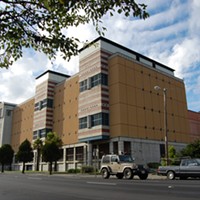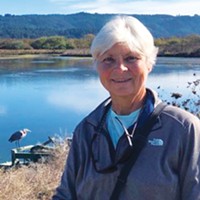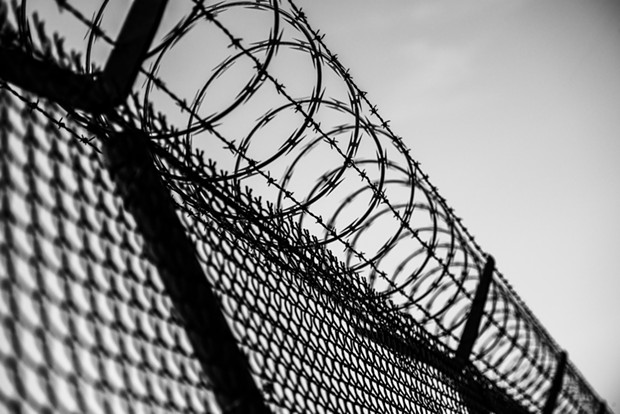[
{
"name": "Top Stories Video Pair",
"insertPoint": "7",
"component": "17087298",
"parentWrapperClass": "fdn-ads-inline-content-block",
"requiredCountToDisplay": "1"
}
]
When I was 23 I arrived at the same correctional facility that my father was sent to a week before his high school graduation in 1972. This would be a recurring theme in my life, repeating the timeline of my father's experiences. Rehabs, jails, overdoses, best friends dying young, drug psychosis, dysfunctional family split-ups and ditching town after town because we had worn out our welcome. The biggest difference between us, other than my multi-ethnic background, was my interest in education.
Neither of my parents graduated high school, my father for reasons above. My mother moved to the states from Japan when she was 12 and never quite fit in with her peers. She first lived in southern Georgia, where calling any Asian person a "dirty Jap" was common even if they were also American. I was told this in my pre-teen years, around the time my father was misdiagnosed with Lou Gehrig's disease, leading him to have a mental breakdown and disappear from the family indefinitely. These events, among others, affected my psyche and I held an angry chip on my shoulder for many years. Family dysfunction allowed me freedom when I was younger and introduced me to a criminal lifestyle early, since I had relatives involved with gangs and heavy drug dealing. I was never a criminal mastermind — far from it. I was an opportunist who was addicted to heroin as a teenager and who hung around in circles with older people doing the same things.
When it wasn't a needle full of dope, I found escape in literature and poetry. I've kept a journal ever since I learned how to write and it made sense of the chaos I was living in. This interest allowed me to keep one foot in with school while the other was dangling out of a boxcar or dragging through community service with other juvenile delinquents. This created somewhat of a problem though — friends at school who were studying for the SATs (and not stealing catalytic converters in the middle of the night with a hand saw) looked at me as quite the outsider. Equally, the people I would drive around (without a license) to deliver dope sacks in south Sacramento never wanted to hear me talk about how poetry was going to save the world. I'm still optimistic about this last part.
I don't know how many classes I missed in the beginning of my college career because I was in jail or rehab, but I do know I maintained good standing with my journalism and creative writing professors, for the most part. The ability to express myself through stories kept me from dropping out. School isn't for everybody and many of my friends are doing great without a degree, but I always believed it was going to propel me to something more.
Instead I found myself at 23 inside a correctional facility, staring down a seven-year prison sentence and wondering if my father had slept on the same bunk I was assigned to. After a couple of months, I discovered other people inside were making plans for when they would return to prison after they were released. They were thinking about getting set up in prison once they were arrested again, as if it was the inevitable. It was at that moment I decided I was done with how I was living and would not return, even if it took me all seven years to work on it.
I didn't blame other inmates for thinking they would return; the system is set up that way and I would often count down the days when I would find myself back on 8th floor lockdown in Sacramento County Jail. The system releases you with a felony, which is an sentence of its own, a stigma, an excuse for people to treat you as someone lesser.
I didn't promise myself I was going to save the world or anything, but I did become aware that the system I was a part of, wanted to keep me within it. It was branding me a criminal forever and making it harder for me to live life outside.
I eventually beat my case on a technicality — you'd have to ask my lawyer because I can't explain it. Instead of seven years locked up, I was charged with a couple of felonies, given a suspended prison sentence and a few more months of incarceration. I moved into a halfway house at the end of 2014, got sober and started volunteering at food banks and a homeless housing project. I also helped bring AA meetings into places like Napa State Prison Hospital and in 2015 re-enrolled at a junior college in a new town. Eventually, I was able to transfer to a four-year college and found myself here, a student at Humboldt State University .
I believe we need a new criminal justice system that isn't racially charged and class motivated, setting up certain people to go to prison indefinitely. But, until then, we need more reentry programs and resources for those who have been swept into the system. There were no resources for formerly incarcerated students at HSU and the club that existed 20 years ago was gone. Since last semester I have been working on starting a club not only for formerly incarcerated students to have a safe space and resources, but for those who want to help bridge the gap between incarceration and education.
As the great poet and Zen Buddhist Gary Snyder said, "Three-fourths of philosophy and literature is the talk of people trying to convince themselves that they really like the cage they were tricked into entering." We can work in the last fourth and, once people are released, set them up for success, not failure.
Speaking of...
-

Robert William Astrue: 1928-2023
Feb 13, 2024 -

HCSO to Allow Family of Inmate to Donate Organs
Dec 1, 2023 -

Susan Ellisa MacConnie: 1952-2023
Oct 1, 2023 - More »
Comments
Showing 1-1 of 1
more from the author
-
Artists Inside
Humboldt County is set to pilot a life-changing arts program. Officials hope it will change the jail, too.
- Jan 9, 2020
-
Hot Sauce is the Right Sauce
Exploring local varieties one bottle at a time
- Dec 12, 2019
-
Charmaine Lawson Holds 31-month Vigil for Her Son, Hopes Documentary Will Bring Outside Attention to Unsolved Case
- Nov 16, 2019
- More »
































